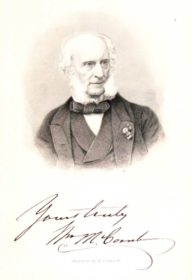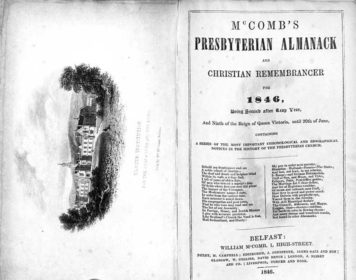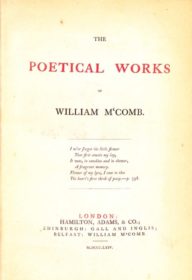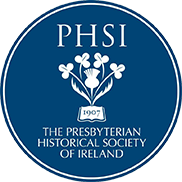 William McComb was born at Coleraine on 17th August 1793, the son of Thomas McComb, linen manufacturer and draper, Londonderry. Through regular visits to Belfast his father became acquainted with Thomas O’Neill, a well known Belfast merchant, who had a wholesale warehouse in Donegal Street. William became apprenticed to O’Neill and there he met Sinclare Ramsay who was also being trained in the same establishment. The two youths were at the forefront in opposing the ideas of Thomas Paine who had set up a school in Smithfield, in opposition to which William and Sinclare conducted a Sabbath School in the same locality. This was one of the earliest Sabbath schools in Belfast.
William McComb was born at Coleraine on 17th August 1793, the son of Thomas McComb, linen manufacturer and draper, Londonderry. Through regular visits to Belfast his father became acquainted with Thomas O’Neill, a well known Belfast merchant, who had a wholesale warehouse in Donegal Street. William became apprenticed to O’Neill and there he met Sinclare Ramsay who was also being trained in the same establishment. The two youths were at the forefront in opposing the ideas of Thomas Paine who had set up a school in Smithfield, in opposition to which William and Sinclare conducted a Sabbath School in the same locality. This was one of the earliest Sabbath schools in Belfast.
From an early date William McComb began writing poetry which appeared in local newspapers and his first book appeared in 1817 – "The Dirge of O’Neill", a verse lament for the harper, Arthur O’Neill. The next volume published in 1822, "The School of the Sabbath" was inspired by his enthusiasm for Sunday School instruction. This was followed in in 1849 with ‘The Voice of a Year or Recollections of 1848’ that describes the scenes of great political drama enacted in 1848. These were to be the first of many future poetical writings that earned him the title "the poet laureate of the Presbyterian Church".
William McComb’s taste for teaching led him to train as a teacher with the Kildare Place Society in Dublin after which he conducted with great success the Brown Street Daily School in the Shankill road area of Belfast that opened as a daily school in 1821, supported by the Kildare Place Society. The Central Library in Belfast holds the minutes and annual reports of this school from 1826.
McComb’s talents soon turned to other areas. He took a keen interest in the Arian controversy so to counteract these views and promote the orthodox cause he commenced his career as a bookseller and publisher in High Street in Belfast in 1828 where he soon had a thriving trade. The Linenhall Library in Belfast has over 120 titles published by him, mostly of a religious nature. It is not surprising therefore that McComb became the publisher of a monthly periodical "The Orthodox Presbyterian2 which was started in 1829 by the leaders of the General Synod of Ulster to expound their views and defend themselves against Arianism. The original editors were the historian of the Presbyterian Church in Ireland, the Rev Dr James Seaton Reid, the Rev Dr Henry Cooke and the Rev Dr Morgan, minister of Fisherwick Place Presbyterian Church in Belfast. McComb was a staunch follower of Dr Cooke as evidenced by the fact that he published many of Cooke’s controversies including "The Repealer Repulsed" in 1841, a satirical account of Daniel O’Connell’s visit to Belfast in 1840 when Cooke challenged O’Connell to debate the Repeal of the Act of Union. A copy of this is available in the Presbyterian Historical Society.
One of his best known poems was "Two Hundred Years Ago" written on the celebration of the bi-centenary of the first Irish Presbytery in Carrickfergus in 1842 where a sermon was preached by Dr Cooke. It received great acclaim by the famous Rev Dr Chalmers. The first verse reads:
‘Two hundred years ago, there came from Scotland’s storied land,
To Carrick’s old and fortress town a Presbyterian band
They planted on the Castle wall the Banner of the Blue
And worshipped God in simple form, as Presbyterians do
Oh! hallowed be their memory, who in our land did sow
The goodly seed of Gospel Truth, two hundred years ago’
Another of his early verse publications was "The Voice of a Year, or, Recollections of 1848" (published in 1849) that reflects on the year of revolutions in Europe in which he outlines Presbyterian millennialism and views the downfall of the French monarchy and the expulsion of Pius IX from Rome as fulfilling the opening of the fourth seal in the book of Revelation.
 William McComb is perhaps best known for his "Presbyterian Almanack and Christian Remembrancer" first published in 1840 which in addition to the usual almanac material, also contains some of his poetry, lists of Presbyterian ministers, histories of congregations, the mission schemes of the Presbyterian Church in Ireland, engravings of Moderators of the General Assembly and accounts of the progress of Presbyterianism in Ireland, Scotland and abroad. Although McComb retired in 1864 his almanacs continued until at least 1889. [The Presbyterian Historical Society has a complete set of the almanacs from 1840 to 1889].
William McComb is perhaps best known for his "Presbyterian Almanack and Christian Remembrancer" first published in 1840 which in addition to the usual almanac material, also contains some of his poetry, lists of Presbyterian ministers, histories of congregations, the mission schemes of the Presbyterian Church in Ireland, engravings of Moderators of the General Assembly and accounts of the progress of Presbyterianism in Ireland, Scotland and abroad. Although McComb retired in 1864 his almanacs continued until at least 1889. [The Presbyterian Historical Society has a complete set of the almanacs from 1840 to 1889].
Although McComb retired in 1864 his almanacs continued until at least 1889. [The Presbyterian Historical Society has a complete set of the almanacs from 1840 to 1889].
 Just before McComb retired from business he published in a very handsome volume a complete editions of his poems, "The Poetical Works of William McComb" which included verse paying tribute to the Rev James Digges la Touche, the late Marquis of Downshire, the Rev Dr Chalmers, the Rev James Morgan of Fisherwick Place Presbyterian and the Rev R M McCheyne. A copy of this is available in the Presbyterian Historical Society library.
Just before McComb retired from business he published in a very handsome volume a complete editions of his poems, "The Poetical Works of William McComb" which included verse paying tribute to the Rev James Digges la Touche, the late Marquis of Downshire, the Rev Dr Chalmers, the Rev James Morgan of Fisherwick Place Presbyterian and the Rev R M McCheyne. A copy of this is available in the Presbyterian Historical Society library.
As revealed in his almanacs, McComb was very active in many charitable organisations, particularly the Ulster Institute for the Education of the Deaf and Dumb and the Blind of which he was co-founder and the first treasurer. He wrote some beautiful verse on the Institute that awakened great public sympathy for the movement. He himself taught blind children at Fisherwick Place school in Belfast.
One is his great passions was gardening and was as an ardent lover of flowers about which he wrote several poems, including one entitled "Funeral Flowers".
Twice married, firstly to Sarah Johnston of Hillsborough who died in 1827 and then to Eliza Barkley in 1830, widow of Captain Robert Walkinshaw Campbell who survived him, he had at least one daughter from his second marriage but may have had other children.
He died at his residence in Colin View Terrace, Belfast, in the 80th year of his age on 13th September 1873.
